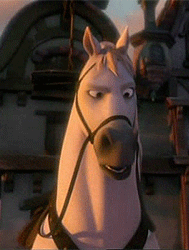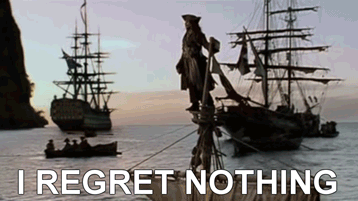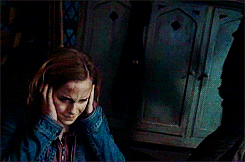Review: Inferno by Dan Brown
“And we came forth to contemplate the stars.”
~ Dante Alighieri, Inferno
 As you can tell by the name, Dan Brown's latest book draws a large part of its mystery from Dante's Inferno. As always, Mr. Brown delivers a thrilling novel steeped in art history,
symbols, and culture. We return, once again, to the world of Harvard
professor Robert Langdon. This time around starts a little bit differently than
the other books. Robert wakes up in a hospital in Florence,
Italy, with a head injury and no memory of leaving Boston. He then, as
usual, embarks on an epic quest for truth, justice, and the
American...wait wrong franchise.
As you can tell by the name, Dan Brown's latest book draws a large part of its mystery from Dante's Inferno. As always, Mr. Brown delivers a thrilling novel steeped in art history,
symbols, and culture. We return, once again, to the world of Harvard
professor Robert Langdon. This time around starts a little bit differently than
the other books. Robert wakes up in a hospital in Florence,
Italy, with a head injury and no memory of leaving Boston. He then, as
usual, embarks on an epic quest for truth, justice, and the
American...wait wrong franchise.
He does embark on an epic quest with his trusty female sidekick, this time a British doctor. As is the norm for Langdon books, there are a lot of twists, turns, and fun facts to learn along the way. But this book also has some interesting ideas and truths about our world to ponder, and offers an insightful, albeit slightly terrifying, view of what could become of the Earth.
Keep reading after the jump to find out more of what I thought about Dan Brown's latest page turner!
Warning: Spoilers ahead!!! Spoilers occur near the end of my review. You'll see another BIG RED WARNING right before we get to that part, so it is safe to read more of my review if you are careful.
Before I jump into anything in-depth, here's a little plot summary for you. Our beloved Robert Langdon wakes up in a Florence hospital with absolutely no recollection of how he got there or why someone tried to shoot him in the head. To add insult to injury, his beloved Mickey Mouse watch is nowhere to be found. After escaping another attempt to kill him, Robert and his doctor, Sienna Brooks, discover a bio-hazard tube among his possessions. They soon figure out that this tube holds the key to a wide-scale plague that is about to be released.....somewhere. They must use the clues from the tube, with some help from Dante's Inferno and works of art inspired by it, to find the location of the plague's release before it's too late. The chase takes them all around old Florence, following in Dante's footsteps, then through more of Italy, and across Europe in a Dan-Brown-standard race against time.
 |
Characters
First on the discussion table, the characters, both old and new.
Robert Langdon
 Robert is charming and smart, as always. I would love to take a class of his, just to see
his mind at work. But in this book, his usual deductive skills are
hampered by amnesia. He and his sidekick are
basically trying to reconstruct the last day or so that Robert spent in
Italy. Given his eidetic memory, his amnesia comes as quite the shock
and really hinders the investigation. But he powers
through and manages to solve the mystery yet again.
Robert is charming and smart, as always. I would love to take a class of his, just to see
his mind at work. But in this book, his usual deductive skills are
hampered by amnesia. He and his sidekick are
basically trying to reconstruct the last day or so that Robert spent in
Italy. Given his eidetic memory, his amnesia comes as quite the shock
and really hinders the investigation. But he powers
through and manages to solve the mystery yet again.
At this point, reading more of Robert's adventures is like reading about a friend. We've seen him go through so much over the course of his four books. Giving him amnesia was a refreshing change ― it was sort of nice to see him flounder a little bit. It made him seem a little more....accessible. My own memory is better than most, to the point that I sometimes pretend to forget things because people look at me funny when I remember some innocuous fact or interaction so clearly. But Robert's memory is far beyond my own; I find it fascinating, and it gives him a little bit of a superhero quality that separates him from others.
Sienna Brooks
 Sienna is Robert's current sidekick. She's young,
blonde, and a super genius. Sienna is a savant-level genius. We are told she has an IQ of 208. She was also
a child theatre star in England. She memorized all of her own character's lines in addition to every other character's lines in one night. She carries her theatrical skills with her
into adulthood, which makes her a master of disguise. With just a few
minor changes, she can completely mask her true figure and make you
believe you are seeing a tourist in love, an old woman, or a skinhead
punk girl. It's quite the talent, and it comes in handy in her travels
with Robert, which, as always, are fraught with danger.
Sienna is Robert's current sidekick. She's young,
blonde, and a super genius. Sienna is a savant-level genius. We are told she has an IQ of 208. She was also
a child theatre star in England. She memorized all of her own character's lines in addition to every other character's lines in one night. She carries her theatrical skills with her
into adulthood, which makes her a master of disguise. With just a few
minor changes, she can completely mask her true figure and make you
believe you are seeing a tourist in love, an old woman, or a skinhead
punk girl. It's quite the talent, and it comes in handy in her travels
with Robert, which, as always, are fraught with danger.
However, Sienna has a little problem with keeping too many thing a secret, stemming from trying to hide her intelligence her whole life. So she brings quite a bit of suspicion down on herself, but you'll have to read the book yourselves to find out how that turns out! I'm not giving it away! Overall, Sienna is probably the most interesting and complicated sidekick Robert has had throughout the series, and I wouldn't mind seeing her again sometime. I've never felt that way about any of his other ladies. I always felt they served their purpose and we could move on from them. Sienna, I wouldn't mind seeing in another story.
The Provost
 The initial impression of the Provost is that of a
villain. He doesn't give us much of a reason to change this impression
through a large portion of the book. However, as that perception does
slowly start to change, the Provost (the only name he's given, by the way) goes from merely a passing interest
to a downright fascinating character.
The initial impression of the Provost is that of a
villain. He doesn't give us much of a reason to change this impression
through a large portion of the book. However, as that perception does
slowly start to change, the Provost (the only name he's given, by the way) goes from merely a passing interest
to a downright fascinating character.
At first he seems almost like a Bond villain. We see him in his lair scheming and contemplating his company's latest project. Despite some hesitation from his staff, he plows ahead with the job they were hired to do without any hesitations of his own. But as the story progresses, we see his composure and resolve to finish the job break down, until he seeks out Robert's help rather than trying to work against him. Rarely do we see a character make the shift from villain to ally. Generally, it's the other way around. It was a very interesting shift to read.
His company is also terribly fascinating. He is the head of an organization called The Consortium, which is basically a large-scale con-artist shop. It can perform a service as small as creating an alibi that enables you to cheat on your spouse, or as large as an Argo-like escape plan used by a government agency. Legal or illegal, doesn't matter to them, they are just the facilitators. According to Dan Brown, the Consortium is an actual company. Whether or not you want to believe Mr. Brown is up to you. But there are companies that do things like this, for example, The Alibi Network. The concept is endlessly fascinating to me. I think it appeals to my inner theatre nerd. It's like putting on a long-term play, but in Real Life.
Bertrand Zobrist
Mr. Zobrist is a genetic scientist with an intelligence level to rival Sienna's. I hesitate to call him a villain, but in the classic breakdown of characters, I suppose that is the bucket into which he would fall. However, we rarely see Bertrand. He is talked about at length and his actions drive the story, but he himself is only seen in flashback. So he is not your typical villain, like we had in Angels & Demons. We will never see Bertrand Zobrist brought to justice, we don't really even get to hear his own thoughts on his actions. Most of his thoughts and rationalizations are told through a third party. I wish this was not the case, as I think he would have been a fascinating character.
However, it is a different kind of fascinating to follow in his footsteps through Langdon's and others' eyes. To try to unravel the madness behind the genius, without being able to communicate with him in any way. The most interesting thing about Bertrand Zobrist is that I'm not sure I actually disagree with what he did. I'm not sure I agree with it either, but he definitely makes a very convincing argument for his point of view. And although it feels slightly dirty to say this, his belief that what he is doing is for the slippery slope of The Greater Good just might be a valid argument. But more on that later.
 |
High Points & Low Points
The best and worst parts of the book...from my perspective.
High Points
As always, for me at least, Mr. Brown's books make me want to learn more about the topic presented. I am an unashamed student. If it were possible for me to remain in school and learn about every topic there is to learn about, I would. I love school and I love learning. So after this particular book, I'd love to learn more about Dante and The Divine Comedy. I actually contemplated reading The Divine Comedy before Inferno, but determined that I wouldn't have time. However, it's now on my TBR list for the very near future. I would also like to learn more about art history, especially the influence that Dante's work had on so many other artists of his time and afterward.
The other high point worth mentioning, is the more global appeal of this book. Most of Mr. Brown's books deal with a subject that has widespread appeal, but not global appeal. The subject matter of this one most definitely (were it actually real) would affect every single person on Earth. Not just Christians or Catholics, like some of his other works. This book also includes more social commentary than some of his other works.
Low Points
There aren't many for me. I quite enjoyed this book. I just have a couple of general gripes.
I don't know if I've simply lost my love of his work, or if this book was actually missing something. But to me, Inferno didn't have the same spark and drive that Angels & Demons and The DaVinci Code had. It didn't seem to have the same passion or fire as his earlier works, even the non-Langdon books. That could be just me, but I felt like this book was missing whatever it was that gave the earlier books such life.
The other low point, for me, was that while Dan Brown's books don't follow quite as drastic a formula of, say, a James Patterson book, now that we are on book #4, we can definitely recognize a certain loose formula that these books follow. I'm not necessarily opposed to this, but it became clear in this book that the Langdon books will have a distinct formula that, if you know what to look for, can give you clues to the upcoming twists and turns of the plot, which can ruin the experience for some.
This is where the spoilers come in!!
Stop reading if you don't want to be totally spoiled!!
Really. Big. Spoilers. Coming. Up. Now.
Stop reading if you don't want to be totally spoiled!!
Really. Big. Spoilers. Coming. Up. Now.
Social Commentary & Other Concepts
As I stated above, this book is about a plague that is going to be unleashed. What I didn't mention is that, in the end, Robert and Company don't actually stop the plague. The countdown they think is for the release of the plague is actually the time at which the plague will have spread across the globe to every country in the world.
What is the reason Bertrand Zobrist created and released this plague upon the world? Overpopulation. It is an undeniable fact that our world's population is growing at an alarming rate. And with all of the medical advances we are making in treating infectious disease and other illnesses, our population is dying at a much slower rate. This is taxing our resources to the breaking point, or so Dan Brown says. I haven't done enough research into this on my own to say for certain, but it doesn't seem a very unlikely scenario given the number of shortages and starving people in our world.
This quote spells out pretty clearly what could happen if nothing is done about the overpopulation of our planet.
Population growth is an exponential progression occurring within a system of finite space and limited resources. The end will arrive very abruptly. Our experience will not be that of slowly running out of gas....it will be more like driving off a cliff.
In times past, a combination of plagues of illnesses, like the Black Plague, and our rudimentary knowledge of medical science kept our population in check. Now illnesses and epidemics that used to wipe out large portions of civilization are no longer doing so. Therefore, our population keeps getting bigger and bigger. The Earth's population did not reach 1 billion people until approximately 1804. Just over 200 years later, it has surpassed 7 billion.* That growth rate is staggering. And that is exactly why Bertrand Zobrist does what he does. He firmly believes that if nothing is done to curb our growing population, humanity as a whole will come to a screeching halt. And it will come to that screeching halt much sooner than anyone is willing to admit. In Bertrand's mind, he is thinking of the greater good of humanity. He does not want to see humanity come to an end, so he engineers his plague to curtail our rapidly expanding population.
Did he do the right thing? That's for you to decide for yourselves. I'm not really sure where my personal opinion lies, but I think that I lean toward saying yes, he did do the right thing. Maybe he didn't quite go about it in the right way, but I would rather my children live in a world where they don't need to worry about things like hunger and food shortages and all of the other things Mr. Brown posits are coming if we don't do something to stop them.
 Now that you are all sufficiently terrified about the end of the world, let me move on to a couple other interesting facts that Inferno brings up.
Now that you are all sufficiently terrified about the end of the world, let me move on to a couple other interesting facts that Inferno brings up.
First, Sienna and several others accuse Robert, and most of humanity, of using denial as a coping mechanism. I don't know about you, but I had never thought about this. Yet it is probably the most often-used coping mechanism among humans. If we just pretend a problem doesn't exist, we don't have to deal with it or worry about it. For example, think about all the current problems in Syria, Greece, the Sudan, and Turkey. Oh, you didn't know or remember those countries were having problems? You just proved my point! Of course, the media doesn't help. They tend to focus on problems a little more frivolous than genocide, government overthrows, and child soldiers. But that doesn't mean these problems don't exist. Don't worry, I'm not saying you need to drop everything you're doing and try to help every cause you can find. Or worry yourself into an anxiety disorder. I just thought this was a very interesting idea that I had never before considered.
Second, Mr. Brown claims that certain drugs, specifically benzodiazepine, can be used to induce amnesia and thereby prevent disorders like Post-Traumatic Stress Disorder. If this is the case, should we be doing this more often? Yes, the patients will lose the memories of at least a day, if not several days of their lives. But if it actually prevents PTSD, should this be something that is presented to patients as an option? Again, that's not my decision to make, but if it were me, I think I might choose losing a day or two of memories to prevent flashbacks and panic attacks. Another interesting idea to explore.
Final Thoughts
So in conclusion, I quite enjoyed Inferno. While it didn't have the same spark that the earlier books had, it still entertained me very well. It presented a number of interesting ideas and gave me a lot to think about. I like books that do that. It does present a worst-case scenario on the future of the planet, though. So if you are easily riled up, maybe this book isn't for you. If you don't mind reading about things like that, I would definitely give this book the Wench Seal of Approval.
 |
** All GIFs come from Tumblr.





I also enjoyed this book, Anne, but maybe not as much as you. I totally agree about it missing something.
ReplyDeleteIt was entertaining enough for me, but not riveting. I kept feeling like it was too formulaic, even with the big twist in the ending. I know exactly what you mean about being able to figure out what’s coming if you know the formula. Also I felt like there were 5 pages of descriptions of architecture and artwork for every page of plot. This is Dan Brown’s style, and I didn’t mind it a bit in the first couple of Langdon books. In fact I could not put those books down. This one I put down repeatedly and had a hard time picking back up and remembering what was going on. Half the fault is probably mine because I’m too tired to read by the time I finish all my outdoor chores and get to sit down this time of year. That makes me impatient with side details that might otherwise engage me. Yet I’m not having this problem with the nonfiction book I’m currently reading...I’m really into it.
I won’t go so far as to say that the plague was a good thing, but it was surprisingly compassionate for a villainous plot! And less painful and unjust than many other possible scenarios we might face instead. Very heavy handed on the social issues, but they are important issues we need to stop pretending don’t exist. So I was happy to see them called out, but I would guess that some readers would disagree.
I enjoyed your review! It makes me realize that the book was better than I was giving it credit for being.
I enjoyed your review Anne. Really interesting ending and I loved your observation about overpopulation.
ReplyDelete